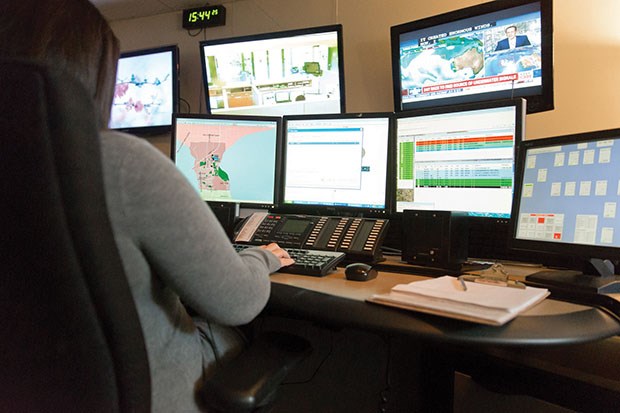They are the calm and in-control voice at the other end of the line when someone is in trouble. They are the ones telling the front-line police officers and first responders where they need to go during an emergency. They are the ones working behind the scenes to ensure emergency personnel have all the information they need to answer any call for help quickly and safely.
They are Delta’s telecommunication operators — they answer 911 calls, non-emergency calls and dispatch emergency responders.
April 13 to 19 is National Public Safety Telecommunication Operators Week, an opportunity to recognize those working unseen behind the scenes.
It’s 3 p.m. at Delta Police Department headquarters in Ladner and 26-year-old Kelly Wales has just started her shift, one that will take her through to 3 a.m.
The room is dimly lit and Wales is working alongside two other dispatchers. While she takes the calls routed to Delta from E-Comm, the Lower Mainland 911 dispatch centre, the other two are in communication with police officers on patrol in Delta.
All three women are seated in front of a glowing bank of computer screens.
Wales gets a call from a 911 area code, which means it’s likely coming from an old cell phone that still has a working battery. While they don’t work to make calls, any cell phone that still has a working battery can call 911.
She listens intently for any signs of distress on the other end of the line.
In this case, it’s obvious a small child has accidentally dialed 911 on an old phone as a small voice can be heard playing in the background.
Wales speaks into her headset trying to get someone’s attention to advise them they’ve called 911.
This, unfortunately, is a common occurrence.
Last year, Delta police operators answered more than 30,000 calls. Of those, 4,335 were classified as abandoned 911 calls, which means a call came in but no one on the line said anything. Of those, only 900 actually required police attention. The rest, almost 80 per cent, were misdials, pocket dials or children playing with phones.
It’s a quiet Monday afternoon in the call centre so far. Over the next hour, Wales deals with two more abandoned 911 calls. One turns out to be a pocket dial from somewhere near Southpointe Academy in Tsawwassen.
Wales is able to trace the call and after hanging up, calls the number back. She gets through to the owner of the phone, advises him he called 911 and asks if he needs assistance. Although he says it was just an accidental pocket dial, he is at home so officers are sent to the location.
The police are required, whenever possible, to meet with the phone owner to make sure the caller is actually OK and not lying or unable to answer truthfully.
With officers on route, Wales gets a bit more information from the man for the file and hangs up.
“This is what I’ve always wanted to do,” she says.
Wales, the daughter of a police officer, applied to the Delta Police Department at 19. She worked in information services for several years before training to be a dispatcher.
“I have so much respect for the officers and the dispatchers,” she says.
The operators and dispatchers are more than just a voice on the other end of the phone line or police radio. They are a vital part of a team that assists those calling for help.
When an emergency call comes in, often times the person placing the call is frantic. It’s the operator’s job to try to calm them down, get the details needed to send help and offer any assistance in the meantime.
Wales says when an emergency call comes in, operators aim to get the six Ws — who, what, when, where, why and weapons.
“More than anything, you need to confirm where,” she says, but getting more information can help officers know the best way to respond to a call.
It can be a stressful job. Operators routinely deal with traumatic situations that most people would hope to avoid, and through it all must remain calm and clear headed.
They work long shifts at all hours of the day and night, often missing holidays, family dinners and major sporting events. It’s all in a day’s work and they wouldn’t have it any other way.
“It’s rewarding taking a call and knowing you’ve helped somebody,” says one of the dispatchers.



